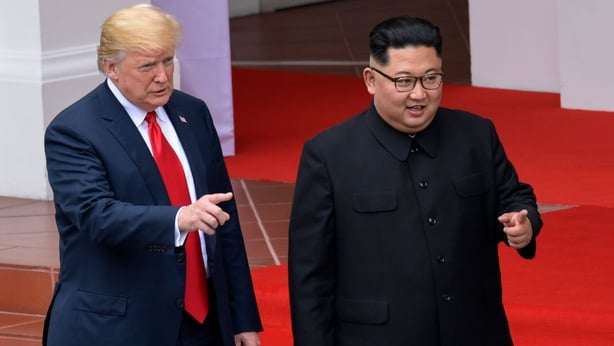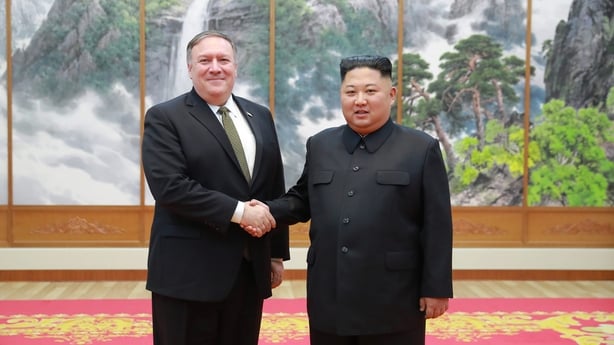Before leaving Washington to travel to Vietnam, US President Donald Trump said he was looking forward to a "very tremendous summit" with North Korean leader Kim Jong-un.
He said he had a "very special feeling" about the talks but it's not exactly clear what will be will be achieved when the two leaders meet for the second time tomorrow.
President Trump and members of his administration have been playing down expectations ahead of the talks. Mr Trump said that he was in no rush to reach a nuclear deal and is happy as long as there are no nuclear tests being carried out.
After their first meeting in Singapore last June, a vaguely worded agreement was signed which promised to work towards the denuclearisation of the Korean Peninsula but the document lacked any specifics about how that might be achieved.
After the summit, President Trump said that North Korea no longer posed a nuclear threat, something which has been disputed by his own intelligence chiefs.

Since the June summit, talks between the two sides have stalled. North Korea wants sanctions to be lifted, something which the US has resisted until it sees full, verifiable denuclearisation.
At the weekend, the US Secretary of State Mike Pompeo hinted that the US may be willing to offer some incentives to North Korea. He told CNN: "If we get a substantial step and move forward [on denuclearisation] we could certainly provide an outlet which would demonstrate our commitment to the process as well."
He warned however that the core economic sanctions would remain in place.
President Trump has also been keen to stress the economic benefits of denuclearisation. He tweeted that without nuclear weapons, North Korea "could fast become one of the great economic powers anywhere in the World". He later added that the country could set records for the speed of its economic growth.
Something that may come out of this week's summit is a formal statement officially declaring an end to the Korean War.

The peninsula technically remains in a state of war since a truce was declared in 1953. South Korean officials have indicated that Donald Trump and Kim Jong-un may agree an end-of-war declaration when they meet in the coming days.
There are concerns that North Korea could argue that if the war is technically over, the US should withdraw its 28,500 troops from the South. But according to officials in Seoul, the declaration would be more of a political statement to offer comfort to North Korea and act as a starting point for further negotiations.
A formal declaration of the end of the Korean War would be a tangible result from the summit and it looks like Mr Trump will need a win this week.
While he's in Vietnam, Democrats in Congress will begin the process of trying to block the national emergency declaration that the US president signed to access funds for his border wall.
Also this week, Michael Cohen, Mr Trump's former lawyer and "fixer", will testify on Capitol Hill. He'll be grilled about hush-money payments to women and a Trump property deal in Russia.
So while Donald Trump may be getting ready to declare the end of one war, it looks like he'll be returning home to multiple battles on the domestic front.







